Postponing health care vote creates new uncertainty — and opportunities

Yahoo News‘ continuing coverage of the Republican efforts to repeal and replace Obamacare comes in the latest Health Care Declassified. We’ll combine our own reporting with the best insights from around the Internet to give you the latest on the future of health care in America.
~
This was the week the revised Republican health care bill was supposed to come up for a vote on the Senate floor in a dramatic showdown, a plan that was still uncertain as late as Saturday. But that changed quickly Saturday night with the news that Sen. John McCain, R-Ariz., had emergency surgery to remove a blood clot, forcing him to rest at home in Arizona — and, because the Republicans have no votes to spare, pushing back a vote on the bill for at least a week and perhaps longer.
That gives Senate Majority Leader Mitch McConnell, R-Ky., more time to win over hesitant senators, but it is unclear whether lobbying by him or the White House will get the votes needed to pass the bill — or even bring it to the floor.
Sens. Rand Paul, R-Ky., and Susan Collins, R-Maine, have said they will oppose a procedural motion to begin debate on the proposal, meaning McConnell can afford no more defectors if he wants to move forward with repealing and replacing the Affordable Care Act.
A top Republican said Sunday that the vote will occur once McCain has recovered.
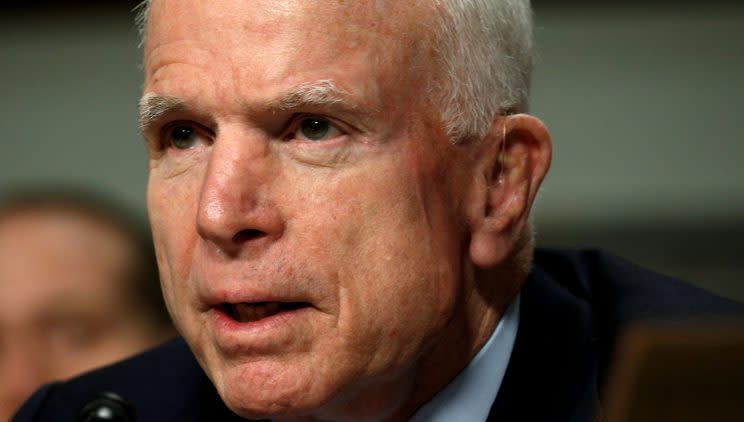
“I believe as soon as we have a full contingent of senators that we’ll have that vote,” Senate Majority Whip John Cornyn, R-Tex., said on “Meet the Press” Sunday.
Republicans have time to play with after McConnell announced last week that he was canceling the first half of the chamber’s traditional August recess. But the original timeline — intended to allow the Senate to move on to other big-ticket legislative items, such as passing a budget — has been scuttled.
The Congressional Budget Office will not release its analysis of the bill Monday. It’s unclear when that report will be released and whether or not it will include the Cruz amendment, a hotly contested change to the bill that would allow insurers to offer bare-bones plans for cheaper rates in insurance exchanges.
Sen. Ted Cruz, R-Tex., says the amendment will lower premiums — at least for healthy adults — but critics say it has the potential to fragment the market and dramatically raise prices for people with pre-existing conditions.
It is unclear whether that provision will be enough to win over one conservative who has expressed doubts about the bill, Sen. Mike Lee, R-Utah. Lee worked on the Cruz amendment but has not taken a position on the overall package, despite lobbying by President Trump this weekend.
Meanwhile, several key insurers said in a letter this weekend to McConnell and Senate Minority Leader Chuck Schumer, R-N.Y., that the Cruz amendment would drive up costs.
“[The Cruz amendment] would undermine protections for those with pre-existing medical conditions, increase premiums and lead to widespread terminations of coverage for people currently enrolled in the individual market,” American Health Insurance Plans, a group representing the largest insurers in he country, said in the letter.
Other critics of the bill are using the delay to make their case. Several top Democrats sent a letter to McConnell Monday arguing that this week should be used to hold public hearings on the legislation, repeating a common criticism that the drafting process has lacked transparency.
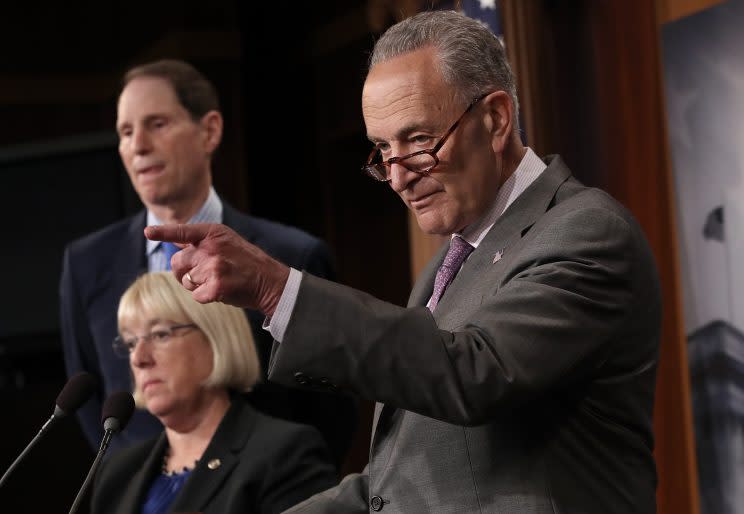
Schumer and Sens. Patty Murray, D-Wash., and Ron Wyden, R-Ore., wrote in the letter, “We request you use this additional time to hold public hearings so that Senators can invite impartial experts, including patients, to testify on the policies in this bill, especially the radically conservative Cruz/Lee proposal released to the public 5 days ago.”
Activist groups are also turning up the heat this week, with a rally planned on Capitol Hill Monday afternoon to rally opposition to the bill. Opponents are also planning sit-ins in the Capitol complex, including several Monday morning targeting undecided GOP lawmakers.
Meanwhile, it is likely that McConnell will continue wooing lawmakers who are still on the fence, using funds raised by preserving several key ACA taxes as carrots. The bill already includes one such sweetener that targets Alaska and that state’s undecided Sen. Lisa Murkowski. McConnell could use the extra time to try to sway Sens. Dean Heller, R-Nev., Rob Portman, R-Ohio and Shelley Moore Capito, R-W. Va.
But Republicans are unsure whether, even with the additional time, McConnell can get the support he needs when the vote eventually happens.
—-
Collins: Eight to 10 Republicans have ‘serious concerns’ about health care bill
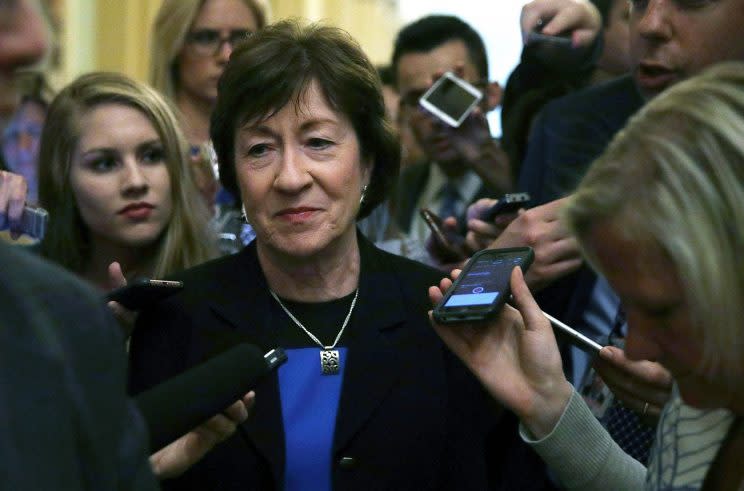
A Republican senator who is against the Senate health care bill said Sunday that eight to 10 Republicans have “serious concerns” about the controversial legislation.
Sen. Susan Collins, R-Maine, said on CNN’s “State of the Union” that she doesn’t know whether the bill will pass but called for hearings on it before “making fundamental changes in a vital safety net program [Medicaid] that’s been on the books for 50 years.”
The senator also disputed Vice President Mike Pence’s claim Friday that the bill “strengthens and secures Medicaid for the neediest in our society.”
“I would respectfully disagree with the vice president,” Collins said on ABC’s “This Week” Sunday. “This bill would make sweeping and deep cuts to the Medicaid program, which has been a safety net program on the books for more than 50 years, ensuring that some of our most vulnerable citizens or disabled children or low-income seniors receive the health care that they need.”
Collins said that the bill would jeopardize rural hospitals and nursing homes, and slammed the Cruz amendment.
The amendment, proposed by Sen. Ted Cruz, R-Texas, would permit health care insurers to sell health care plans that don’t adhere to all of Obamacare’s rules as long as they also sell plans that comply with the policies.
Collins, a moderate Republican, called the provision “unworkable” on CNN.
“I do want to see more flexibility in the insurance market, but Sen. Cruz’s approach is not the answer,” Collins said. “It would result in undermining the protections for people with preexisting conditions and create two separate groups of individuals, and some of them would have very skimpy insurance coverage at a low price.” — Julia Munslow
_____
Kasich spokesman calls out Pence for using inaccurate health care stats
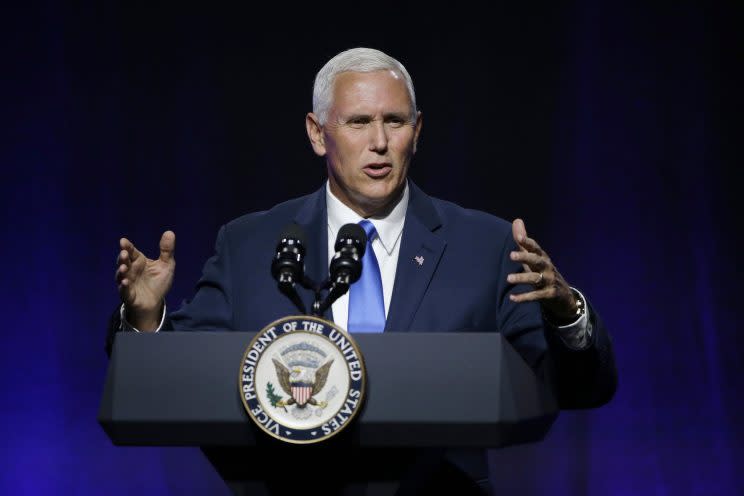
Vice President Pence proclaimed that the Affordable Care Act had left 60,000 disabled Ohioans waiting for health care at a governors’ meeting Friday — a claim a spokesperson for Ohio Gov. John Kasich flatly refuted on Saturday.
“I know Gov. Kasich isn’t with us,” Pence said, “but I suspect that he’s very troubled to know that in Ohio alone, nearly 60,000 disabled citizens are stuck on waiting lists, leaving them without the care they need for months or even years.”
Pence’s statement is “not accurate,” Kasich spokesperson Jon Keeling told the Washington Post, saying that Pence’s assertion about the ACA health care system for the disabled “is false, as it is just the opposite of what actually happened.”
The waiting lists that Pence was most likely referring to are for Medicaid’s home and community services. Though long in most states, these waiting lists are often shorter in states that took advantage of the ACA’s Medicare expansion than in those that did not, Diane Rowland, Henry J. Kaiser Family Foundation’s executive vice president, told the Washington Post.
Kasich, who has previously defended Ohio’s medicaid expansion, publicly denounced the Senate’s health care legislation on Friday for its deep cuts to Medicaid and failure to address rising costs. He urged the Senate to look for a bipartisan alternative.
Gov. John Kasich’s statement on the Senate health care reform bill: pic.twitter.com/0LCBu5B0xh
— John Kasich (@JohnKasich) July 14, 2017
“These shortcomings flow from the fact the Senate plan commits the same error as Obamacare — it’s not bipartisan,” Kasich said in a statement on Twitter. “It fails to bring solutions from both sides to the table that can ensure we aren’t simply replacing one divisive plan with another.” — Taylor Rogers
_____
Biden: GOP bill is ‘enough to make your blood boil’
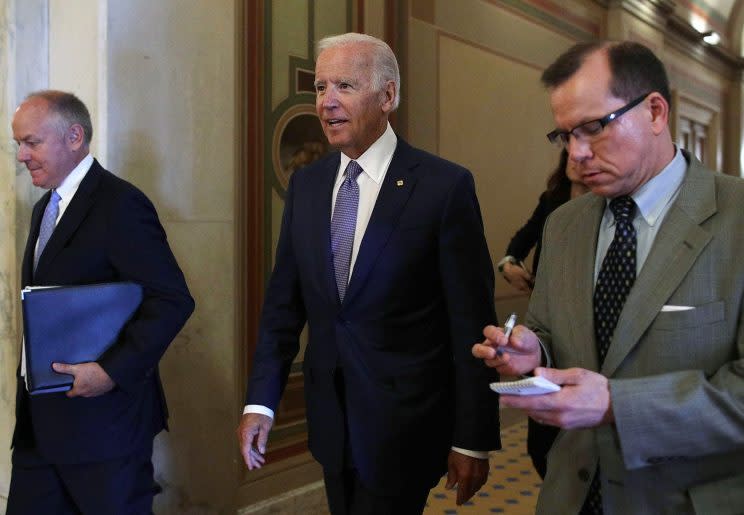
Former Vice President Joe Biden expressed his continuing support for the ACA and disdain for the BCRA in an Op-Ed in the Washington Post on Monday. Biden argued that although the Affordable Care Act is not perfect, it is a far better solution to the nation’s health care woes than the GOP plan.
“The ACA isn’t perfect, but the choices we made when designing the law flowed from a commitment to provide the best possible care to the most people,” Biden wrote. “Compare that to Republican proposals, which the nonpartisan Congressional Budget Office has said will mean more than 20 million fewer people will have health coverage by 2026, and millions more will no longer have the same protections provided by the ACA.“
The senate veteran cited his 36 years of experience to explain his concerns about the Cruz amendment, the bill’s cuts to Medicaid, and its provisions for addiction treatment.
“They want to drag us back to a time — not all that long ago — when Americans could be denied basic health care because they were unable to afford it,” Biden wrote. “That’s the reality of where we are today and it’s enough to make your blood boil.” — Taylor Rogers
_____
Paul: Health care bill will be downfall of Republican party
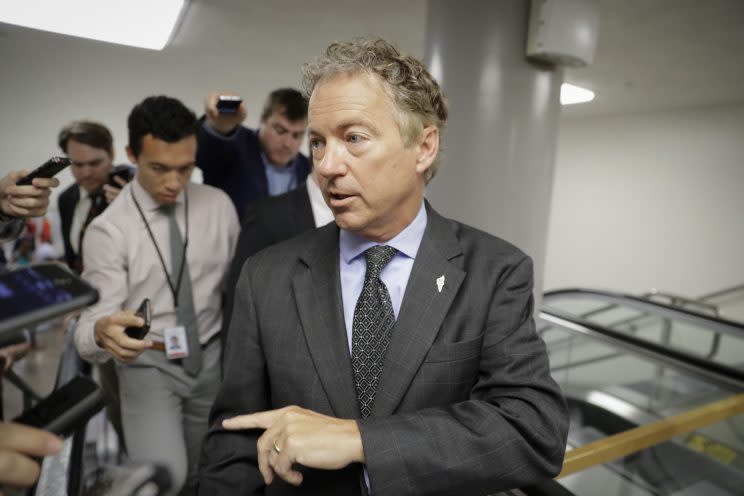
Sen. Rand Paul, R-Ky., said that the GOP’s Senate bill to dismantle Obamacare is not a true repeal bill, and warned it could lead to the demise of the Republican party.
Republicans have campaigned for four election cycles on the promise to repeal and replace Obamacare, but the current Senate bill “has nothing to do with repeal,” Paul said Sunday on CBS’ “Face the Nation.”
Voters “elected us to repeal Obamacare,” Paul said. “And now we’re going to keep most of the taxes, keep the regs, keep the subsidies and create a giant bailout superfund for the insurance companies. I just don’t see it.”
The Kentucky Republican also said that the bill keeps the “fundamental flaw” of Obamacare: insurance mandates.
“[The mandates] cause the prices to rise, which chase young, healthy people out of the marketplace, and leads to what people call adverse selection, where you have a sicker and sicker insurance pool and the premiums keep rising through the roof,” Paul said.
Paul said on Fox News Sunday that he does not believe the current bill will pass the Senate, but that a more narrow repeal bill might gain enough support to pass. — Julia Munslow
_____
Read more from Yahoo News:
The 4 senators who could thwart the revised Senate health care bill
White House publishes profanity-laced criticisms of its voter fraud commission
Taiwanese lawmakers launch water balloons, brandish chairs in floor brawl
In debate over political speech, pastors say they fear the IRS ‘pulpit police’
Photos: At least 9 dead, 1 still missing in Arizona flash flood

